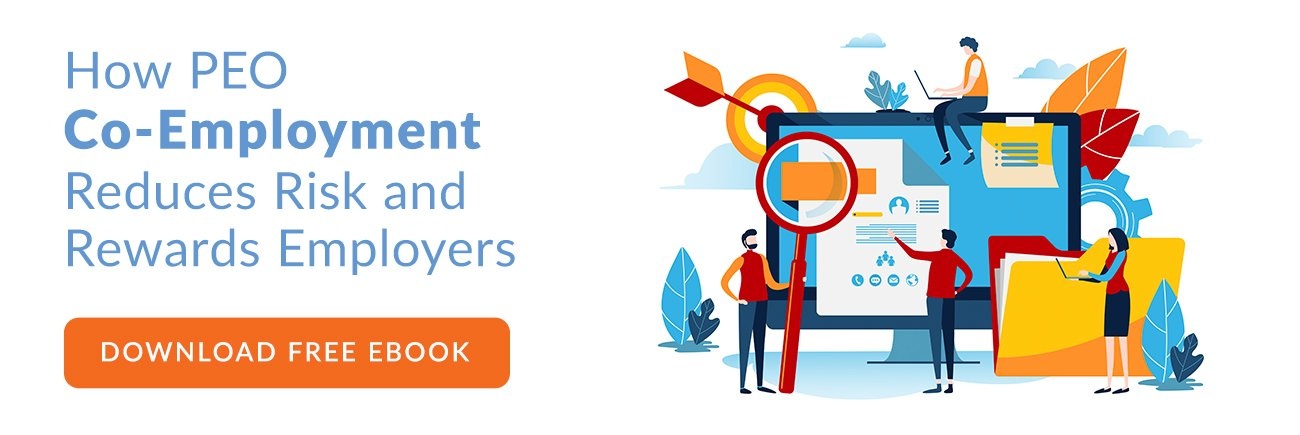As a small or medium-sized business, you need every advantage you can get. You are competing for employees with other small businesses and the Fortune 500 companies with much higher budgets.
One advantage your company can gain is co-employment, but many companies are afraid to use it, causing them to fall behind other companies of similar size that do have a PEO co-employment relationship. The primary reason for this is confusion between the co-employment mechanism as applied to PEOs versus staffing agencies. The two are not remotely the same thing. PEO co-employment does not take away any of your control over your employees.
In fact, companies that use PEO co-employment have annual revenue growth twice that of comparable firms that don’t, are 16% more likely to report an increase in profitability and have expected annual median revenue growth that is 40% greater.
What is a PEO?
A Professional Employer Organization (PEO) is a comprehensive HR outsourcing solution that uses the co-employment mechanism. The PEO takes on all routine HR matters, including things like payroll, benefits administration, the tedious parts of onboarding, etc. They also provide assistance with everything from developing safety programs to compliance. This gives your in-house team time to focus on core priorities like employee relations.
What is Co-Employment?
Co-employment is a mechanism that basically splits employment responsibilities between you and another company. That is to say, your employees have two employers.
The PEO becomes their employer of record, with your employees being listed under their Federal Employer Identification Number (FEIN). This means that they are the employer for official purposes such as taxation and workers’ compensation.
Meanwhile, you keep full control over hiring, firing, and daily work conditions.
What’s the Difference Between PEO Co-Employment and Staffing Agency Co-Employment?
Staffing agencies do have their place, for example, if you need an employee for a few months to cover maternity leave.
However, staffing agency co-employment can result in being labeled a “joint employer.” Joint employment is not a place you or your employees want to be. Joint employment exists in two forms.
Vertical joint employment is where the employee has an employment relationship with one employer but is economically dependent on another. Horizontal joint employment is where the employee has an employment relationship with two or more employers related to one another. Vertical joint employment is what can come into play with staffing agencies.
When you have a vertical joint employment relationship, then you can become liable if the staffing agency fails to comply with employment law. The employee can sue both of you.
With PEO co-employment, the full burden of wage and hour compliance falls on the PEO, while worksite compliance (OSHA, etc) falls on you. This means that you are at no risk of being liable for somebody else’s payroll error. At the same time, PEOs will guide you through all worksite compliance requirements.
What Are the Benefits of PEO Co-Employment?
So, what can PEO co-employment do for your business? There are many significant benefits.
Affordable, Fortune 500 Employee Benefits
In the benefits marketplace, large employees have a significant advantage. Put bluntly, they can negotiate at scale. This often means they can get better benefits for a much lower rate per employee.
Small companies end up paying more per employee, out of a smaller budget. This often means that they have to provide substandard or minimal benefits. They may have to offer health plans with higher deductibles or have employees shoulder more of the premiums.
PEO co-employment fixes this. Because the PEO is the employer of record, they are responsible for benefits, which means your employees can join their master plan. Instead of being on a plan with 50 or 100 employees, they may be on one with thousands across all of the PEO’s clients. This means you can get those high-quality benefits for your employees, making it easier to attract and retain talent.
Payroll Tax Remittance
A payroll provider can tell you what to remit. A PEO can remit the taxes for you. This means that you don’t have to worry about ensuring employment taxes are filed in time.
The PEO will file all of the taxes under their own FEIN and collect the money as appropriate, removing a major compliance headache for you.
Total HR Compliance
Handling compliance with federal, state, and local employment laws can be a full-time job. A PEO can help with compliance with all relevant laws, not just payroll and administration.
They can give you access to trained, full-time compliance officers who can give you the advice you need. They can even do things like send you the correct OSHA posters to display.
Pay-as-you-Go Workers’ Comp Insurance
Typically, you pay workers’ comp by putting down an initial deposit for the year based on your likely payroll, and then you may get some of that money back at the end of the year.
This can be a cash flow nightmare for smaller businesses. PEOs can help with that by paying the initial deposit for you and then charging you only monthly premiums. This is the only way to get true pay-as-you-go workers’ compensation insurance.
Why Use a PEO?
So, why should you use a PEO? There are numerous reasons, but the most significant are better benefits, improved compliance, pay-as-you-go workers’ comp, and avoiding the trap of joint employment. Also, co-employment does not result in any loss of control, unlike when working with a staffing agency.
This is only the tip of the iceberg. Working with a PEO can get you everything from access to their knowledge on safety training to payroll processing to all that free time to work on improving your company culture.
It is simply the best comprehensive HR outsourcing solution out there.



